Get outside with your family and get involved in your garden! Beneficial pollinators are extremely important to our environment and way of life. Spend time together and learn about plants that attract pollinators, start a Pollinator Journal together and observe all of the wildlife around your plants, and enjoy a simple craft project with Calloway’s Premium Bird Seed.
THE IMPORTANCE OF POLLINATION

Pollination is more than aiding in the creation of beautiful plants, it is essential to ecological survival. All plants need to be pollinated and the human race depends on pollinators for our world’s survival. Our food and plant-based products require pollination which creates higher crop yields and more flavorful fruits. Did you know that more than half of the world’s healthy fats and oils, like sunflower oils and canola, come from pollinated plants?
Take a breath of fresh air and thank pollination. Pollination produces flowering plants which in turn create breathable oxygen for our world. Since levels of carbon dioxide have been increasing at an alarming rate in the last century, pollination is the key to keeping our plant population thriving. Without pollinators, our plant population would decline throughout our world.
Plants also help our water system and prevent soil erosion. The water cycle depends on plants to return moisture back to the atmosphere and we need pollinators to keep those plants thriving.
POLLINATOR GARDEN GROWING: PLANT TO ATTRACT POLLINATORS
You can help pollinators and the ecosystem by planting selections known for attracting beneficial bugs and birds like bees, hummingbirds, and butterflies. Here are some great options for planting now!
Pentas
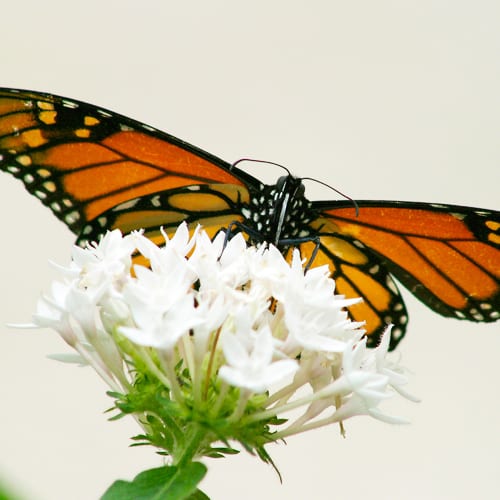
Pentas are heat-tolerant, and have star-shaped blooms clustered on top of dark green foliage. It does best in full sun to partial shade and is a perfect choice for adding dynamic color to your flowerbeds or containers. With nectar-rich blooms, Pentas are one of the best pollinator-friendly plants you can grow.
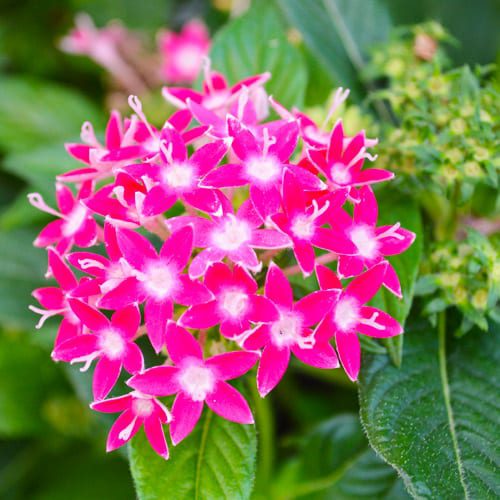
Bees, butterflies, and hummingbirds love Pentas and will make it a popular plant in your landscape. Plant with Calloway’s Premium Flowerbed Garden Soil in your flowerbeds or Calloway’s Premium Container Potting Soil in your container gardens.
Lantana
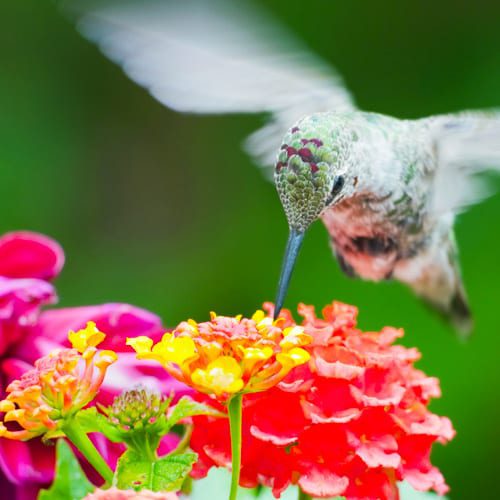
Love butterflies? Plant Lantana! Butterflies love this heat and drought-tolerant plant that is a perfect addition for your summer garden. Lantana produces a vibrant display of colorful flowers clustered among the green foliage. It is deer-tolerant and easily adapts to both dry and moist soil conditions. Lantana does best in full sun to partial shade and thrives in your sunny flowerbeds and containers. Plant with Calloway’s Premium Flowerbed Garden Soil for healthy and happy roots.
Perennial Salvia
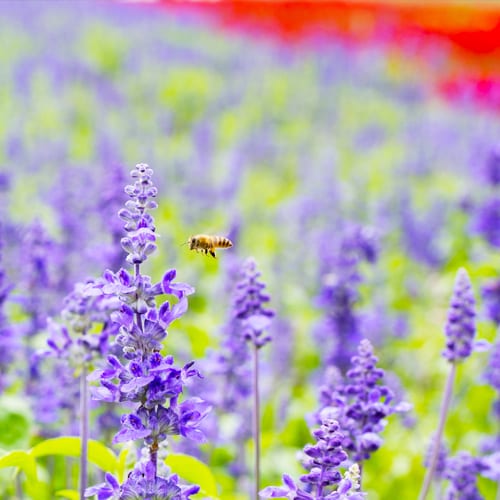
Salvia is a gorgeous shrub with spikes of flowers. It is a great choice for attracting butterflies and hummingbirds, yet it is deer-tolerant. Bees also enjoy the nectar-rich blooms. Salvia does best in full sun to partial shade and prefers moist soil conditions. It shouldn’t be allowed to dry out. Plant with Calloway’s Premium Flowerbed Garden Soil and enjoy these unique and gorgeous blooms.
Esperanza
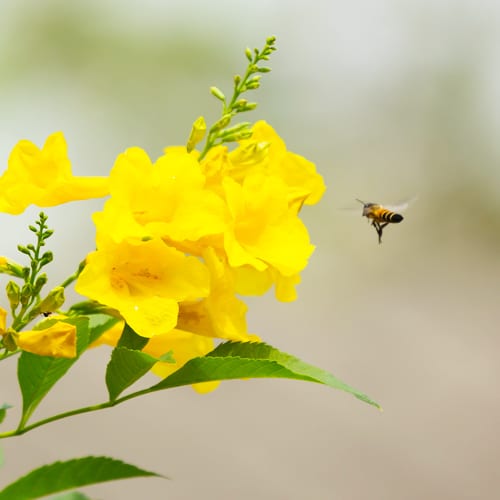
Esperanza, also known as Yellow Trumpetbush, is a heat-loving and full shrub covered in yellow trumpet-shaped flowers. It can grow to be about 6 feet tall with a spread of 4 feet. Bees, hummingbirds, and butterflies will love to visit this plant. Esperanza does best in full sun to partial shade. It prefers moist soil conditions and shouldn’t be allowed to dry out. The upright habit makes this plant a great selection for a “Thriller” plant in your landscape design. Plant with Calloway’s Flowerbed Garden Soil for gardening success.
Althea
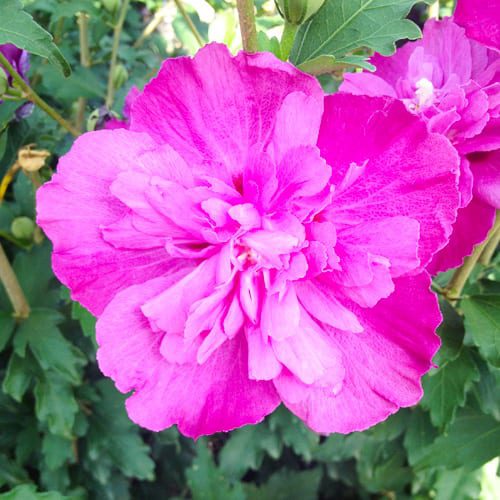
Althea contains double blooms that adorn this medium-sized shrub from mid to late summer. It will easily adapt to your garden and is great in mass plantings. Drought-tolerant, Althea grows best in partial sun to full sunlight. It attracts bees, hummingbirds, and butterflies to your garden, but is deer-tolerant and rabbit resistant! Plant with Calloway’s Premium Tree & Shrub Garden Soil.
Hibiscus
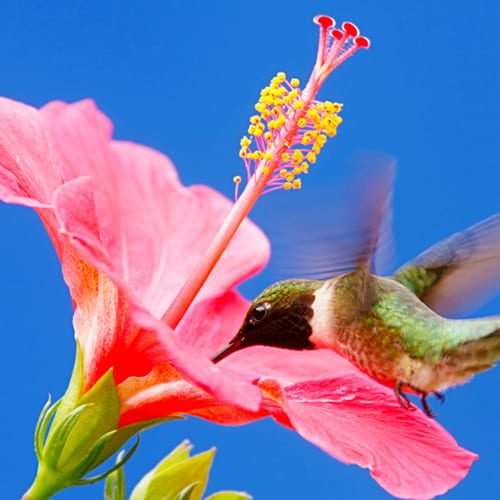
Hibiscus plants are pollinated by insects like butterflies, but they are a favorite to hummingbirds, who account for most of its pollination. Hummingbirds hover over the open bloom and draw the nectar from the plant while coating themselves in pollen. The pollen is then sprinkled to other plants by the flapping of the hummingbird’s wings. Hummingbirds are attracted to the bright colors of Hibiscus plants, especially the red hues. The shape of Hibiscus blooms forms a bull’s eye which guides the hummingbird to the flower. Hibiscus does best in full sun when planted in a landscape and enjoys partial shade when planted in a container. It requires a well-draining soil like Calloway’s Premium Tree & Shrub Garden Soil.
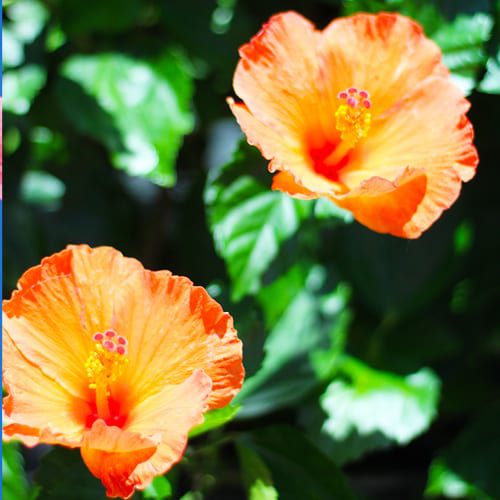
For more tips on how to properly plant shrubs, check out our blog here!
POLLINATOR JOURNAL
Now that you know some great plants to add to your landscape. Watch them work! Spend some time with your kiddos and start a Pollinator Journal. Teach your family about the different plant selections and relax outside while you observe the different visitors throughout the day. Take notes of the time of day and the quantities of bees or butterflies enjoying your plants. Then, sketch a picture of what you see. Spending time with art and creativity will help you learn and grow about your plants and pollinators.

DOWNLOAD OUR FREE POLLINATOR JOURNAL FOR YOU TO PRINT AND ENJOY HERE!
POLLINATOR GARDEN GROWING: SUPPORT POLLINATORS TO YOUR GARDEN
BUG HOUSES
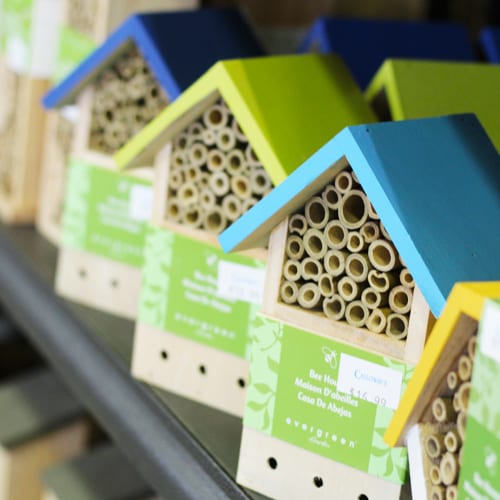
Provide shelter and support for pollinators with more than just plants. Explore our selection of bug houses from Evergreen®, like bee houses and ladybug houses. These adorable homes create a safe place for beneficial bugs to nest and lay eggs. The design is made to mimic a natural habitat that bees need.
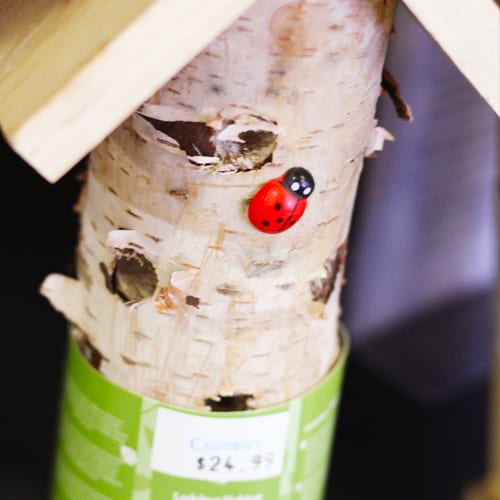
All bug houses are available in different sizes and styles, you are sure to find the perfect house to add to your landscape.
BIRD FEEDERS
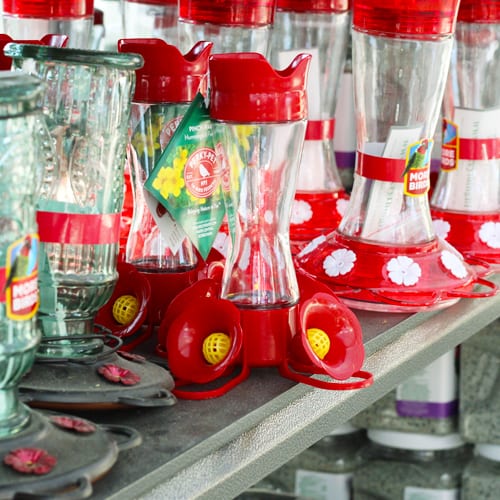
Bird Feeders and birdbaths are another great way to attract pollinators to your landscape. Birds need food, shelter, and water to maintain the energy required to properly pollinate. Check out our Birding Center at our store nearest you to explore our vast selection of feeders, bird seed, nectars, and more!
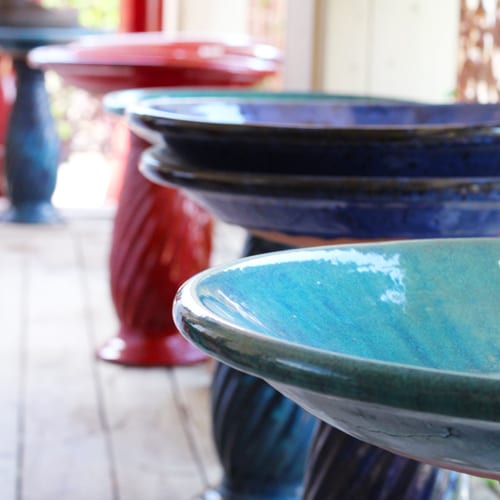
Want to create your own bird feeder? Try this craft project with your family and make your own. The key to a successful bird feeder is the quality of seeds. Calloway’s Premium Bird Seeds are made with top ingredients that birds love.
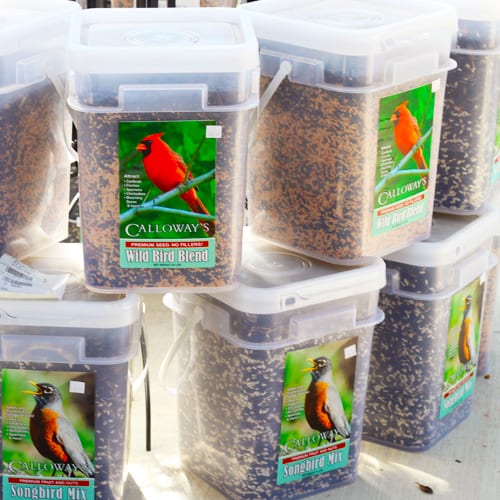
HOW-TO MAKE A PEANUT BUTTER BIRD FEEDER
SUPPLIES:
- Stale Bread
- Peanut Butter
- Calloway’s Premium Bird Seed
- Cookie Cutters
- String
Step 1: Cut Out Shape and String Hole

Get your slice of stale bread and use your cookie cutters to create a cute design. Stale bread is stronger than regular bread and will be able to support the weight of the bird seed.

After your shapes are made, use a straw and make the hole for the string. Add the string so that it will be ready to hang up after adding the rest of the ingredients.
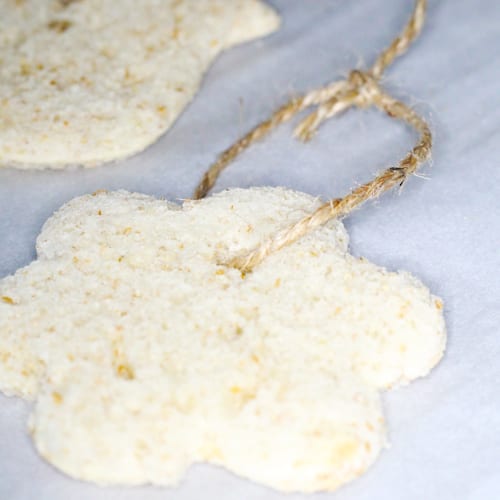
Step 2: Spread Peanut Butter
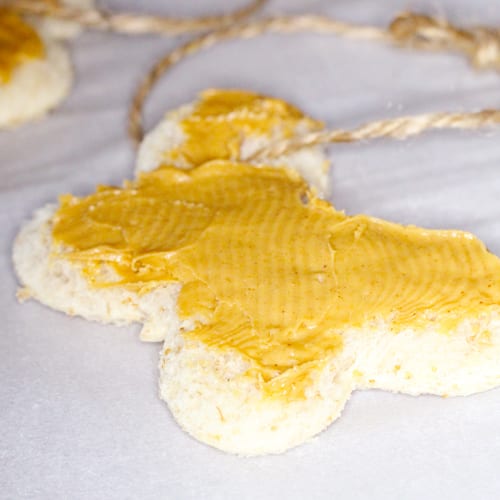
Spread peanut butter over each slice of bread. Cover generously so that it can hold an adequate amount of bird seed!
Step 3: Add Bird Seed

After you add your peanut butter, place into a pan full of bird seed. Allow the bird seed to completely coat and cover the peanut butter.
Step 4: Feed The Birds
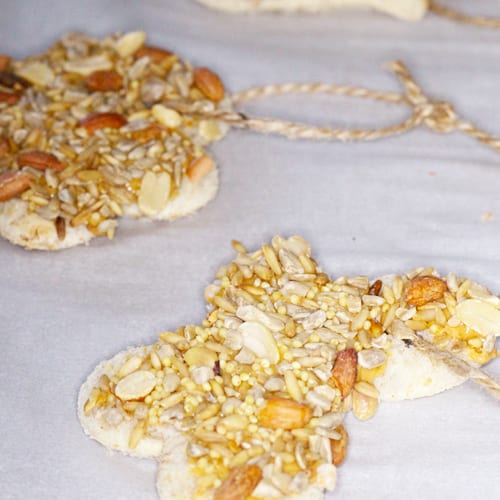
When everything is complete, take it outside and tie to a tree branch. Allow an adult to help hang the bird feeder if working with kids. Then, sit back and watch the show of birds that will come to visit your creation! Take notes in your journal and have fun working together to help our friendly pollinators.
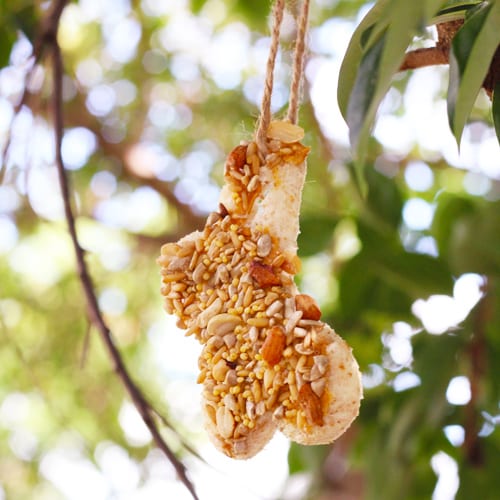
3 WAYS TO SHOP
At Calloway’s and Cornelius, we want to make gardening easier for you with 3 ways to shop. Our open-air stores are here for you to enjoy, or you can call our store nearest you and place an order over the phone for Curbside Pickup! Plus, try shopping online! We are working diligently to add more inventory to our online stores for your gardening ease! When you shop online, you can select Curbside Pickup or use home delivery!
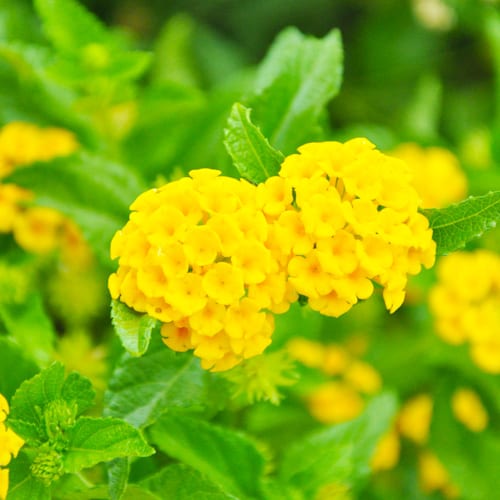
Questions about plant care, availability, or quantities of plants? Call our store nearest you! Our Texas Certified Nursery Professionals are here to help with your planting needs!
Enjoy the gift of time we have together and the beautiful weather outdoors. Engage in your garden to learn and grow as a family in your plant knowledge. This is a great opportunity to focus on helping our world and what better way than to support pollinators! Work together as a family keeping our environment thriving! Remember, don’t worry, BEE happy!
REF: tylerpaper.com , gardendebut.com , sensiblegardening.com , sciencing.com , yourconroenews.com , fs.fed.us